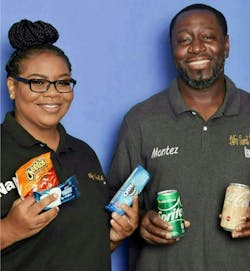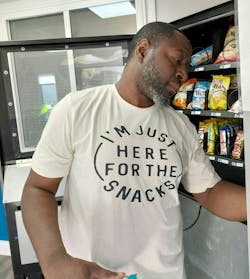Small operators fuel the growth of vending as they chase the American dream
A recent article in the Wall Street Journal, “Chasing Passive Income, Americans Turn to Vending Machines,” points to vending as a strong investment trend of the 2020s. There are plenty of slices of the vending pie to go around, as the article notes that “America has 3 million vending machines, an $18.2 billion industry, with the average machine generating about $525 in monthly revenue, according to the National Automatic Merchandising Association” and that “more than half of operators bring in less than $1 million a year,” according to Automatic Merchandiser’s State of the Industry for Vending and Micro Market 2022 report.
“Vending machines might seem an unlikely candidate for a trending investment of the 2020s, but the idea has captured the imagination of Americans dreaming of easier money,” Joe Pinsker writes in the Journal article. “Some pursue chips and soda as a side hustle because their regular paychecks aren’t enough for them to get by. Others bet on vending machines as a ticket to upward mobility, to quitting their jobs and becoming their own boss.”
Finding a service niche
Al Hernandez of ACS will confirm that there are many new entrants into the vending and OCS business. After more than a decade with Royal Cup, Hernandez started his own company in October 2020, which specializes in providing installation and service support for predominantly small operators in the Southeast, mostly Georgia. Currently, ACS serves 150 operators, offering a much-needed solution for small operators who are often short on time and staff.
Hernandez acknowledged that his company has found a nice niche, often responding to service calls in just a few hours, giving even the smallest operators a much stronger service department than they could have on their own. He also offers a warning for entrepreneurs who are attracted to the vending business. “There’s a lot to learn – it’s not as easy as some of the YouTubers make it seem, but we’ve seen companies that started just three years ago, and now they’re doing really good, so there’s always the possibility of success,” Hernandez said. “But you are going to have to work really hard if you want to succeed.”
Tough times for new operators
In an interview for Automatic Merchandiser’s Vending & OCS Nation podcast, Jennifer Fox – of Fox Vending in the Chicago area – said she wonders if it is a good time to be a new vending operator because the cost of doing business on items like insurance has created a major barrier for entry. “Just look at your set costs, the fluctuating cost of fuel. The fact that your fuel bill could double within a year, which it does every summer. I can’t go out and double my prices to recoup that. That’s just right off the bottom-line. There is just so much overhead,” Fox said.
Making it work in the Lowcountry
Despite the challenges, small operators are finding ways to not only survive but also flourish. In the beautiful Lowcountry region of South Carolina, Nakia White-Hazel and her husband jumped into the vending business in 2019 when they started their company, Life’s Sweet & Savory Vending. After navigating their way through the pandemic, the company has centered their operation around a U.S. military base. With only four employees, White-Hazel and her husband are totally hands-on. “We are both out there working morning and night, dealing with every aspect of the business,” she said.
A former teacher, White-Hazel said she is a South Carolinian through and through, which gives her small company a competitive advantage, leading to lots of referral business.
“We were born here, educated here, raised here – we have conversations with our clients about local events or history and the growth of the area and what we’ve seen change over time,” White-Hazel said. “We are into our community and events. I think that is a big thing for our company of how we embrace being from the Charleston area as part of our makeup.”
Constant reinvention
White-Hazel said that from her standpoint, being a small operator today means constant reinvention.
“When we got into the business, we were all about vending machines – these types of vending machines, those type of vending machines – and we have realized over these years, times are changing, technology is changing, and you must change with it – you have to know when to pivot.”
Embracing technology is one way that White-Hazel has changed. “We did not have card readers on all of our vending machines at first, then we finally realized, it’s time. Let’s go ahead and make that happen – let’s get those devices on the equipment. It has definitely helped,” she said. “We have also moved into the micro market business, and we are operating single-cup brewers.”
For White-Hazel, it is all about a slow and steady growth strategy. “We don’t want to rush it and make huge mistakes. We would rather go slow so that we can identify problems and take care of them quickly. We want to make sure we are keeping our eyes on everything,” she added.
Smaller is better
“In 2013, I decided to downsize so I sold part of the company off,” said Cuccolo. “We only operate a couple of routes. It’s truly a family business. We’re not a big company at all. I streamlined it, consolidated and condensed it to be more profitable,” he said. “My mom always used to say, ‘bigger doesn’t mean better, it means bigger,’ and I kind of took those words to heart.”
Cuccolo continued, “I think I’m more content with where I’m at right now. It’s controlled, it’s profitable, and I enjoy what I do again. There was a time there when I was running ragged, and you’re just trying to maintain the size and the employees, and I just got to the point where it wasn’t worth it anymore. I needed to make a change, but this is all I know.”
According to Cuccolo, scaling back to a four-person operation was an excellent decision. “I have a thumbprint on everything we do. I wear multiple hats, so it can get crazy at times, but I’m in touch with every customer, whether it’s through text, email, phone call or in person. I have a pulse on what’s going on, and the retention of our customers has been a lot better since the downsizing,” he said. “We’re here to make money, but there’s a human side to this too, and that’s what I enjoy the most – meeting people, taking care of their needs, learning who they are as people.”
About the Author

Bob Tullio
Bob Tullio is a content specialist, speaker, sales trainer, consultant and contributing editor of Automatic Merchandiser and VendingMarketWatch.com. He advises entrepreneurs on how to build a successful business from the ground up. He specializes in helping suppliers connect with operators in the convenience services industry — coffee service, vending, micro markets and pantry service specifically. He can be reached at 818-261-1758 and [email protected]. Tullio welcomes your feedback.
Subscribe to Automatic Merchandiser’s new podcast, Vending & OCS Nation, which Tullio hosts. Each episode is designed to make your business more profitable.



